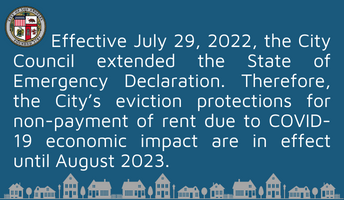THE PUBLIC POLICY & RESEARCH UNIT
Los Angeles ranks as one of the least affordable cities for housing. Rent costs are extremely high for city residents – almost 58% of renter households are cost burdened and almost 32% of renter households are severely cost burdened. In addition to the difficulties of being cost burdened, we have learned that despite recent efforts from the city to provide more legal assistance to tenants facing eviction, only a small proportion of tenants in eviction cases are represented by lawyers, compared to 95% of landlords. This aligns with the reality that there are approximately 1.9 million rental units in Los Angeles County, more than 40,000 eviction cases filed in the last year before the COVID-19 pandemic and about 50 attorneys who specialize in eviction defense. These rental cost issues and insufficient access to necessary legal representation play a detrimental lead in to potentially higher eviction rates and eventually dire outcomes like homelessness. The Public Policy & Research (PP&R) Unit addresses these types of housing inequities through all of our current policy proposal work, and will continue to do so as part of our anti-eviction efforts such as through the City’s proposed Eviction Defense Program (EDP).
The unaffordable housing income gap and the insufficient number of available affordable housing units for lower income (and even many moderate income) individuals and families continues to impact residents. For example, the 2020 Greater Los Angeles Homeless Count indicates that the City has experienced a 14.2% increase in its homeless count, this is a horrendous rise to 41,290 homeless individuals. These are the types of challenges that the city seeks solutions to address the deep affordable housing crisis. Given this framework, LAHD’s PP&R Unit provides proactive research and analysis, and gathers data in support of the advancement of innovative programs and public policies. Our work centers on identifying funding sources, policy constraints, analyzing land use policy tools with direct housing implications and solutions that address affordable and neighborhood change issues. PP&R staff enhance and protect existing programs while supporting federal, state and local legislative proposals designed to create habitable housing, rent affordability, incentivize the development of affordable housing, and preserve the city’s existing housing inventory and continued community investment. Our core focus includes Policy Development and Research, Data and Geospatial Analysis.
The following reflects the PP&R Unit’s policy work inventory:
Affordable Housing and Sustainable Communities Program
The Affordable Housing and Sustainable Communities (AHSC) Program is a competitive state funding program that aims to reduce greenhouse gas emissions by funding compact affordable housing in conjunction with sustainable transportation improvements. It provides funding for affordable housing development and related infrastructure, as well as transportation-related amenities, and programs that encourage residents to walk, bike and use transit. Funded by auction proceeds from California’s Cap-and-Trade program, AHSC helps create holistic communities with affordable housing and transportation options near jobs and other key destinations. AHSC is administered by the Strategic Growth Council (SGC) and implemented by the California Department of Housing and Community Development.
Since launching in 2015, AHSC has invested over $1.7 billion in affordable housing and sustainable transportation improvements across the state. AHSC awarded over $1.2 billion to support 102 projects in the first four rounds of the program. These 102 awards will support over 9,400 housing units, more than 85 percent of which are affordable; more than 150 miles of new or improved bike lanes; and more than 1,000 new or improved crosswalks. Overall, this has led to a reduction of 2.1 million metric tons of CO2-equivalents and about 223,000 pounds of criteria air pollutants.
To date, the City of Los Angeles has successfully secured approximately $330.8 million to support 28 developments, 2,943 new housing units out of which 2,668 are affordable and an array of GHG emission-reducing transit infrastructure projects.
For additional information click here.
Affordable Housing Linkage Fee Program
The City is continuously facing a critical time with the threat of severe federal funding cuts and limited to non-existing local resources for affordable housing. The Affordable Housing Linkage Fee (AHLF) provides the City of Los Angeles a permanent and self-sustaining local resource that will create long-term and innovative housing funding programs. Based on projected development activity, over the next decade the Affordable Housing Linkage Fee is anticipated to bring in millions of dollars to the city’s affordable rental and homeownership housing programs.
The City Council adopted the Affordable Housing Linkage Fee Ordinance (No. 185342) on December 13, 2017. The Ordinance places a fee on certain new market-rate residential and commercial developments to generate local funding for affordable housing production and preservation. The fee was phased in beginning on June 18, 2018 and the amount of the fee varies by the type of use and by geography across the city. The AHLF also includes various exemptions and deductions based on certain characteristics.
In concurrence with the adoption of the Affordable Housing Linkage Fee Ordinance, the Housing Impact Trust Fund (HITF) Ordinance (No. 185341) outlines provisions for the creation of the new Trust Fund as well as a mandate that funds generated by the Affordable Housing Linkage Fee (AHLF) be easily tracked and monitored to ensure maximum accountability and transparency as required under the California Mitigation Fee Act.
For additional information click here and here.
Housing Element 2021-2029
In January, LAHD and LA City Planning jointly launched the 2021-2029 Update to the Housing Element. The Housing Element identifies Los Angeles’ housing needs and establishes clear goals and objectives to inform future housing decisions. State Law requires that the Housing Element is updated every eight years. The current Housing Element covers the period from 2013-2021; the update will cover 2021-2029. For this Housing Element update, the City of Los Angeles is also required to identify fair housing goals, with highest priority to addressing barriers in access to opportunity, in compliance with a newly enacted state law, SB 686. To meet state requirements, the Housing Element Update must be adopted by the City Council prior to October 1, 2021. Find information on the current Housing Element, sign up for email notifications about the update, and learn more about upcoming opportunities to get involved. You can also view a recording of a webinar that explains the Housing Element in English and Spanish.
MORE INFORMATION COMING SOON
Fair Housing
Assessment of Fair Housing (AFH) Plan (2018-2023)
Advancing fair housing involves taking meaningful actions to overcome historic patterns of segregation, promote fair housing choice and foster inclusive communities. Together with the Housing Authority of the City of Los Angeles (HACLA), LAHD served as the lead entity in the process of developing a joint Assessment of Fair Housing (AFH) to identify fair housing issues and develop strategies to reduce existing barriers. The AFH was required by the U.S. Department of Housing and Urban Development (HUD) as a condition for receiving federal funding to Affirmatively Further Fair Housing (AFFH) within the City of Los Angeles.
The Assessment of Fair Housing (AFH) Draft Plan identifies fair housing issues and develops strategies to reduce existing barriers throughout the City of Los Angeles. Based on the U.S. Department of Housing and Urban Development’s (HUD) data and the City’s local data, as well as feedback gathered during the community participation process, the AFH Draft Plan outlines recommendations to promote fair housing choice and foster inclusive communities. The goals and priorities demonstrated in the AFH Draft Plan will be used to inform future policy development in the City of Los Angeles.
The AFH Plan was completed in Fall 2017. We invited the public to review the AFH Draft Plan and submit comments to LAHD. The 45-day comment period began on August 16, 2017 and concluded on September 29, 2017.
To view the Final AFH Plan, visit:
Due to the importance of fair housing, PP&R staff led the completion of comments on this issue over the past few years on behalf of the City. Equitable housing policy remains as one of the key issues for PP&R staff to continuously monitor and promote.
To view LAHD’s previous comment letters on AFFH, please click on the following links:
- Comments on HUD’s Proposed AFFH Assessment Tool 2015 (Docket No. FR-5173-N-05)
- Comments on HUD’s Proposed AFFH Assessment Tool 2014 (Docket No. FR-5173-N-02)
- Comments on HUD’s Proposed AFFH Rule-HCHF 2013 (Docket No. FR-5173-N-01)
- Comments on HUD’s Proposed AFFH Rule-LAHDandPartners 2013 (Docket No. FR-5173-N-01
Anti-Displacement Projects
The PP&R Unit is in the process of influencing anti-displacement city policies through meaningful research, proposals, and data-driven solutions. These efforts are to ensure housing retention for residents in gentrifying neighborhoods and to ensure long-term tenants continue to live in safe, secure, and affordable housing.
FORTHCOMING RESEARCH AND REPORT BACKS TO BE INCLUDED
Local Housing Policy
Affordable housing is a key component for achieving a livable, sustainable, and equitable city. Our public policy work centers on formulating recommendations, improving regulations, and designing programs to help preserve and produce new affordable housing while also promoting anti-displacement efforts. Our projects include strengthening tenant protections, spearheading initiatives such as a new Eviction Defense Program, analyzing land use incentives to encourage additional affordable housing, promoting sustainable development, and administering new local sources of funding. This work assists the LAHD, the Mayor and the City Council to help shape housing policy outcomes for the city’s residents. The following are examples of the PP&R Unit’s housing policy development work:
Reports, Ordinances, and Support Resolutions to City Council on Local Housing Policy Issues
- Empty Homes Vacancy Tax Report, 2020
- Affordable Housing Linkage Fee Oversight Committee Report, 2020
- Eviction Defense Program (EDP) Report, 2019
- Prohibit Discrimination Against Section 8 Voucher Holders, Final Ordinance, 2019
- Affordable Housing Linkage Fee Oversight Committee Report, 2019
- Permanent Supportive Housing Ordinance and Interim Motel Conversion Ordinance Report, 2018
- Affordable Housing and Sustainable Communities, Local Housing Agencies Support Resolution, 2015
- Affordable Housing and Sustainable Communities, Housing Committee Presentation, 2015
- CRA Dissolution Former Tax Increment Dollars for Affordable Housing, 2014
- Affordable Housing Funding Crisis, Overview Presentation to Housing Committee, 2014
- Condo Conversions, Demolitions, Tenant Protections, 2006
- Residential Hotel Report and Draft Ordinance, 2004
Local Land Use Housing Planning
- Master Planned Development Zone, City Planning Commission, Comment Letter, 2015
- USC University Park Specific Plan
Economic Studies
Federal and State Legislation & Regulations
We proactively track, monitor and support or oppose state and federal legislation and program proposals that impact the City of Los Angeles’ affordable housing goals and objectives. Our legislative focus involves working with the LAHD executive team, Mayor and City Council to establish legislative priorities annually, reviewing and analyzing proposals and providing technical support for the development of local, state, and federal housing and neighborhood change policy issues. Some of our legislative work includes the following:
- Initiate city resolutions that support, amend or oppose legislative proposals
- Propose amendments through the Mayor’s Office to engage State or Federal legislators on priority issues
- Collaborate with both the Mayor and City Council staff on new policy and/or program proposals
Fiscal Year 2019-20 State and Federal Legislative Proposals
State Legislative Roundup (2019 Session Results)
State Legislation Support Resolutions
- AB 35 (Chiu, Atkins), 2015, Increase State Tax Credit Ceiling, City Support Resolution
- AB 1335 (Atkins), 2015, Building Homes and Jobs Act, City Support Resolution
- AB 1229 (Atkins), 2013, Inclusionary Housing, City Support Resolution
- AB 391 (DeSaulnier), 2013, California Homes and Jobs Act, City Support Resolution
State Program Comment Letters and Fact Sheets
- California Air Resources Board (ARB) Cap and Trade Auction Proceeds Funding Guidelines Comment Letter, 2015
- Cap and Trade Auction Proceed Spending, Comment Letter, 2013
- Veteran’s Housing and Homelessness Prevention Program Notice of Funding Availability (NOFA) Fact Sheet, 2015
Federal Program Proposals, Resolutions, and Submitted Comment Letters
- CDBG-CV, CARES Act Allocation Letter, 2020
- Affirmatively Furthering Fair Housing (AFFH) Comment Letter, 2020
- Proposed HUD Rule – Mixed Immigration Status in Public Housing, Chief Legislative Analyst Report – City Resolution, 2019
- Responses to U.S. Treasury’s RFI – Data Collection and Tracking for Qualified Opportunity Zones, 2019
- Federal Public Charge Rule, Chief Legislative Analyst Resolution to Oppose, 2018
Federal Program Fact Sheets
- Home Investment Partnerships Program (HOME) Budget Cuts, Fact Sheet, 2015
- Establishment of National Housing Trust Fund, Fact Sheet, 2015
Building Homes and Jobs Act (SB 2, 2017) Permanent Source of Funding
In 2017, Governor Brown signed a 15-bill housing package aimed at addressing the state’s housing shortage and high housing costs. Specifically, it included the Building Homes and Jobs Act (SB 2, 2017), which established a $75 recording fee on real estate documents to increase the supply of affordable homes in California. The revenue collected from the fee is distributed directly to local jurisdictions through a formula allocation and can be used to:
- Increase the supply of housing for households at or below 60% of area median income
- Increase assistance to affordable owner-occupied workforce housing
- Assist persons experiencing or at risk of homelessness
- Facilitate housing affordability, particularly for lower- and moderate-income households
- Promote projects and programs to meet the local government’s unmet share of regional housing needs allocation
In its inaugural year, the City of Los Angeles will receive approximately $26 million through the Permanent Local Housing Allocation (PLHA) program, with the potential to receive up to $130 million over the next five years. The City plans to use this funding for affordable housing production, preservation of affordable housing, and emergency rental assistance for tenants facing eviction. To view the current proposed allocation plan click here.
Local Early Action Planning (LEAP) Grants Program
Background
The Local Early Action Planning Grants Program (LEAP Program) is made available as a portion of the Local Government Planning Support Grants Program pursuant to Chapter 3.1 of Health and Safety Code (Sections 50515.03 (Chapter 159, Statutes of 2019). The Program provides funding to jurisdictions for the preparation and adoption of planning documents, process improvements that accelerate housing production, and facilitate compliance in implementing the sixth cycle of the Regional Housing Needs Allocation (RHNA).
Purpose
The LEAP Program is part of the broader Program formerly known as the Local Government Planning Support Grants Program, which was established as part of the 2019-20 Budget Act. The 2019-20 Budget Act provides a spectrum of support, incentives, resources and accountability to meet California’s housing goals. Some specific elements include:
- Planning Support (local and regional planning grants)
- Incentives (Prohousing preference and infill incentive grants)
- Funding Resources
- Accountability (penalties for non-compliant housing plans)
- Reform (collaborative processes to reform regional housing needs)
The Local Government Planning Support Grants Program provides one-time grant funding to regions and jurisdictions for technical assistance, preparation and adoption of planning documents, and process improvements. The overarching goals of the Program are to (1) accelerate housing production; and (2) facilitate compliance to implement the sixth cycle of the regional housing need assessment (RHNA). The Notice of Funding Availability (NOFA) was released January 27, 2020 and applications are reviewed on a rolling basis through January 31, 2021. The award amounts of Local Government Planning Support Grants are based on a jurisdiction’s population size. The City of Los Angeles is eligible for a maximum award of $1,500,000.
Eligible Applicants
Eligible applicants are limited to local governments (i.e., cities and counties). However, local governments may partner through legally binding agreements with other forms of governments or entities where the proposal will have a direct effect on land-use or development within the participating localities. This includes, but is not limited to, partnerships with other localities, regional governments, housing authorities, school districts, special districts, community-based organizations, or any duly constituted governing body of an Indian Reservation or Rancheria.
Current NOFAs
The California Department of Housing and Community Development (Department) announced the release of its Notice of Funding Availability (NOFA) for approximately $119,040,000 as part of the LEAP Program. The LEAP application deadline is January 31, 2021. The City, led by LAHD’s PP+R staff, successfully submitted its LEAP application on July 1, 2020. The staff report outlining eligible activities and Resolution can be found here.








